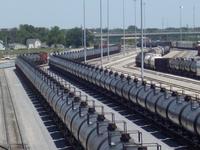-
Border surveillance towers deployment on hold as GAO seeks reevaluation

DHS’s plan to deploy fifty surveillance towers across southern Arizona is temporarily on hold, following a protest by Raytheonthat the agency improperly awarded the work to rival EFW. In a decisionreleased last Thursday by the Government Accountability Office(GAO), DHS has been asked to reevaluate the competitors’ proposals, saying that it is possible Raytheon was “prejudiced by the agency’s errors” during an evaluation of proposals.
-
-
DHS urged to investigate use of DHS grants for Motorola emergency comm. devices
Three senior House Democrats have requested DHS’s Office of Inspector Generalto investigate allegations claiming Motorola’s contracting tactics have led state and local governments unnecessarily to spend millions of dollars on the company’s proprietary devices, including its two-way emergency radio systems.
-
-
Tennessee man pleads guilty to attempting to extort a nuclear contractor
Adam Winters, 26, of Robbins, Tennessee, has pleaded guilty in a $2.5 million extortion case involving Babcock and Wilcox, a managing contractor at the Y-12 National Security Complex in Oak Ridge. According to Oak Ridge Today, Winters sent the contractors an e-mail on 8 May, threatening to injure their reputation by publishing roughly 1,200 slides containing evidence from nuclear testing, including the amount of radiation used on animals.
-
-
WIPP radiation leak investigation focuses on Los Alamos National Laboratory (LANL)
The U.S. Department of Energy’s (DOE) accident investigation team reviewing the leak at the Waste Isolation Pilot Plant (WIPP) in Carlsbad, New Mexico has turned its focus to the Los Alamos National Laboratory (LANL). Communications between LANL and EnergySolutions, the contractor which packaged LANL’s waste for shipment to WIPP, have revealed that EnergySolutions switched from using an inorganic clay-based absorbent in the storage drums to an organic wheat-based mixture. Scientists are now trying to determine whether the switch to the organic substance is to blame for the chemical reaction that led to the explosion.
-
-
Details of oil shipments by rail are not security sensitive and should be released: DOT

The boom in U.S. oil shipments by rail is largely due to the growing production of shale oil from the Bakken fields in North Dakota and Montana, but also due to the slow construction of new oil pipelines. U.S. freight railroads are estimated to have carried 434,000 carloads of crude oil in 2013, compared to 9,500 carloads in 2008. In 2014, 650,000 carloads of crude oil are expected to be carried. So far U.S. crude oil shipments by rail have reached a record 110,000 carloads in the first quarter of 2014. Transportation Secretary Anthony Foxx issued an order in May for railroads to provide states with details on routing and oil-train volumes. Last week, U.S. Department of Transportationofficials affirmed that details about volatile oil train shipments are not sensitive security information, thereby allowing states to release such information to the public.
-
-
Security flaw: Researchers find thousands of secret keys in Android apps
Researchers have discovered a crucial security problem in Google Play, the official Android app store where millions of users of Android, the most popular mobile platform, get their apps. “Google Play has more than one million apps and over 50 billion app downloads, but no one reviews what gets put into Google Play — anyone can get a $25 account and upload whatever they want. Very little is known about what’s there at an aggregate level,” says one of the researchers.
-
-
NNSA says security at Y-12 National Security Complex has improved
Retired Air Force lieutenant-general and now National Nuclear Security Administration(NNSA) chief Frank Klotz asserted last week that security at the Y-12 National Security Complexat Oak Ridge National Laboratory(ORNL) has improved significantly since a 28 July 2012 break-inat the plant when three aging peace activists, led by an 82-year old nun, managed to breach the facility’s supposedly impregnable perimeter security systems.
-
-
Feds, rail operators, Washington State embroiled in crude oil shipment disclosure dispute

Last month the U.S. Department of Transportation(DOT) ordered rail carriers with trains carrying crude oil to notify state officials in the states through which the trains pass about the volume, schedule, and routes of these trains. The amount of crude oil transported by trains has grown dramatically – from 6,000 carloads in 2005 to more than 400,000 carloads in 2013. The increase in the volume of crude oil shipping has been accompanied by a sharp rise in the number of accidents and derailments. DOT’s order was meant to allow states’ first responders to be prepared, but the railways treat shipping information as “security sensitive” and refuse to share it with states’ officials unless the information is distributed to emergency response groups for planning purposes only. Washington State says that state laws require that such information be made public.
-
-
Urgent need: Dirty bomb detection technology which does not rely on helium
It has taken 4.7 billion years for Earth to accumulate our helium reserves, but these reserves are dwindling at an alarming rate, and will be exhausted by around 2025. The supplies we have originated in the very slow radioactive alpha decay that occurs in rocks, and there is no chemical way to manufacture helium. The Department of Defense and other agencies use Helium-3 (He-3) to detect neutrons emanating from Special Nuclear Material (SNM) in order to counter the threat of nuclear-fueled explosives such as dirty bombs. Since the supply of He-3 is rapidly drying up, the Defense Threat Reduction Agency (DTRA) awarded a $2.8 million contract to Alion Science and Technology to develop a replacement technology which will detect neutrons without relying on He-3.
-
-
Canada donates Biosafety Level 3 modular laboratory to Caribbean health authorities
The Biological Security program of Canada’s Global Partnership Program(GPP) has officially transferred a new biological containment laboratory to the Caribbean Public Health Agency(CARPHA). The Biosafety Level 3 (BSL-3) modular laboratory facility, a first in the Caribbean and located in Port of Spain, Trinidad and Tobago, improves diagnostic capabilities for human and veterinary pathogens with high epidemic potential.
-
-
Leidos awarded DHS Plum Island biolab contract
DHS awarded Reston, Virginia-based Leidos a prime contract to support and supplement the Science and Technology (S&T) Agricultural Scientific Program at the Plum Island Animal Disease Center (PIADC). The single-award time and materials (T&M) contract has a one-year base period of performance, four one-year options, and a total contract value of approximately $12 million if all options are exercised. Work will be performed in Orient Point, New York.
-
-
Critics: U.K. nuclear watchdog plagued by “indefensible” conflicts of interest
Britain’s nuclear watchdog, the Office for Nuclear Regulation(ONR), is receiving technical advice from companies it is tasked with monitoring, leading industry insiders to accuse the watchdog of accepting advice tainted with “unbelievable” conflicts of interest. ONR’s chairman, Nick Baldwin, noted that the agency is concerned about possible conflicts of interest, but that there is a “small gene pool” of firms capable of advising ONR inspectors.
-
-
Guard fired for Y-12 breach says he was made a scapegoat for contractor’s failings
Kirk Garland, a security guard at the Y-12 National Security Complex in Oak Ridge, Tennessee, was fired from his job two weeks after three aging peace activists, led by an 82-year old nun, managed, on 28 July 2012, to breach the facility’s supposedly impregnable perimeter security systems, then loiter, unnoticed, on the grounds of the facility, where bomb grade uranium is stored. The activists had enough time to spray-paint peace messages and Bible verses on walls, slosh the walls with human blood, and wrap one of the buildings with crime-scene tape. In an arbitration hearing, Garland argued that he was made a scapegoat for the larger failings of the then-security contractor,Wackenhut Services.
-
-
Is your iPhone at risk after the Oleg Pliss hack?
iPhone users in Australia were greeted with an alarming message this week when they tried to use their devices. They were told that a hacker or group of hackers going by the name Oleg Pliss had taken control of their phone and will lock it permanently unless a $100 ransom is paid. It’s not yet clear whether the attack is likely to affect iPhone users outside Australia but even if it doesn’t, the attack has raised questions about the security of the iPhone. Apple products have a reputation for being more secure than others and this is the first major attack of its kind. iPhone is one of the most secure smartphones and that is still true. This attack is a very clever compromise but it does not actually hack into your phone. Instead, Oleg Pliss seems to have found a way of attacking the remote server that supports an iPhone user’s iCloud account.
-
-
Floating solar power plants offer many benefits
Water-based solar plants are at least 50 percent more efficient than a land-based solar power system.The water on which the plant floats helps extending the life of the photovoltaic panels, meaning greater efficiency and performance from the solar panel system, and the plant also prevents nearly 90 percent of the evaporation for the surface area that it covers, an important benefit in dry climates.
-
- All
- Regional
- Water
- Biometrics
- Borders/Immig
- Business
- Cybersecurity
- Detection
- Disasters
- Government
- Infrastructure
- International
- Public health
- Public Safety
- Communication interoperabillity
- Emergency services
- Emergency medical services
- Fire
- First response
- IEDs
- Law Enforcement
- Law Enforcement Technology
- Military technology
- Nonlethal weapons
- Nuclear weapons
- Personal protection equipment
- Police
- Notification /alert systems
- Situational awareness
- Weapons systems
- Sci-Tech
- Sector Reports
- Surveillance
- Transportation
Advertising & Marketing: advertise@newswirepubs.com
Editorial: editor@newswirepubs.com
General: info@newswirepubs.com
2010-2011 © News Wire Publications, LLC News Wire Publications, LLC
220 Old Country Road | Suite 200 | Mineola | New York | 11501
Permissions and Policies
Editorial: editor@newswirepubs.com
General: info@newswirepubs.com
2010-2011 © News Wire Publications, LLC News Wire Publications, LLC
220 Old Country Road | Suite 200 | Mineola | New York | 11501
Permissions and Policies
